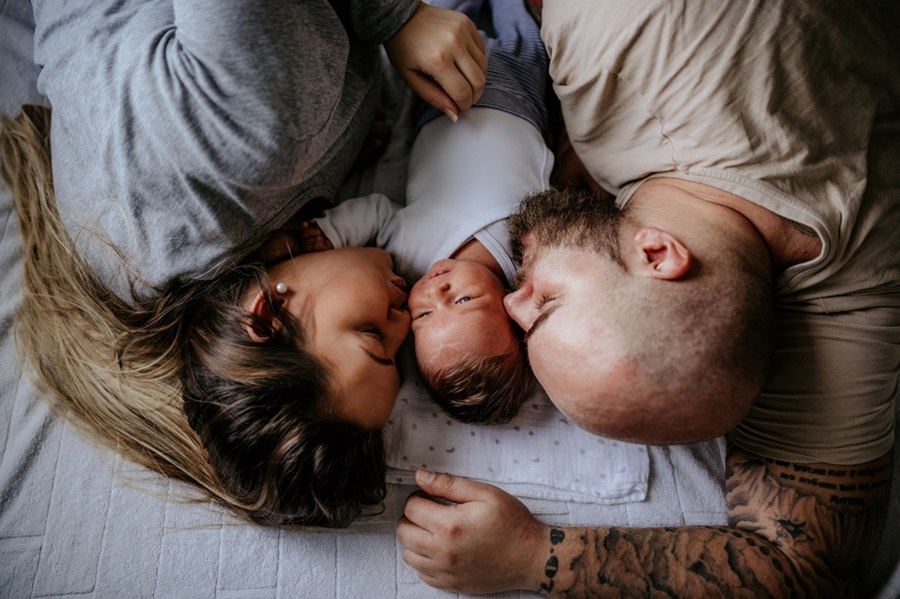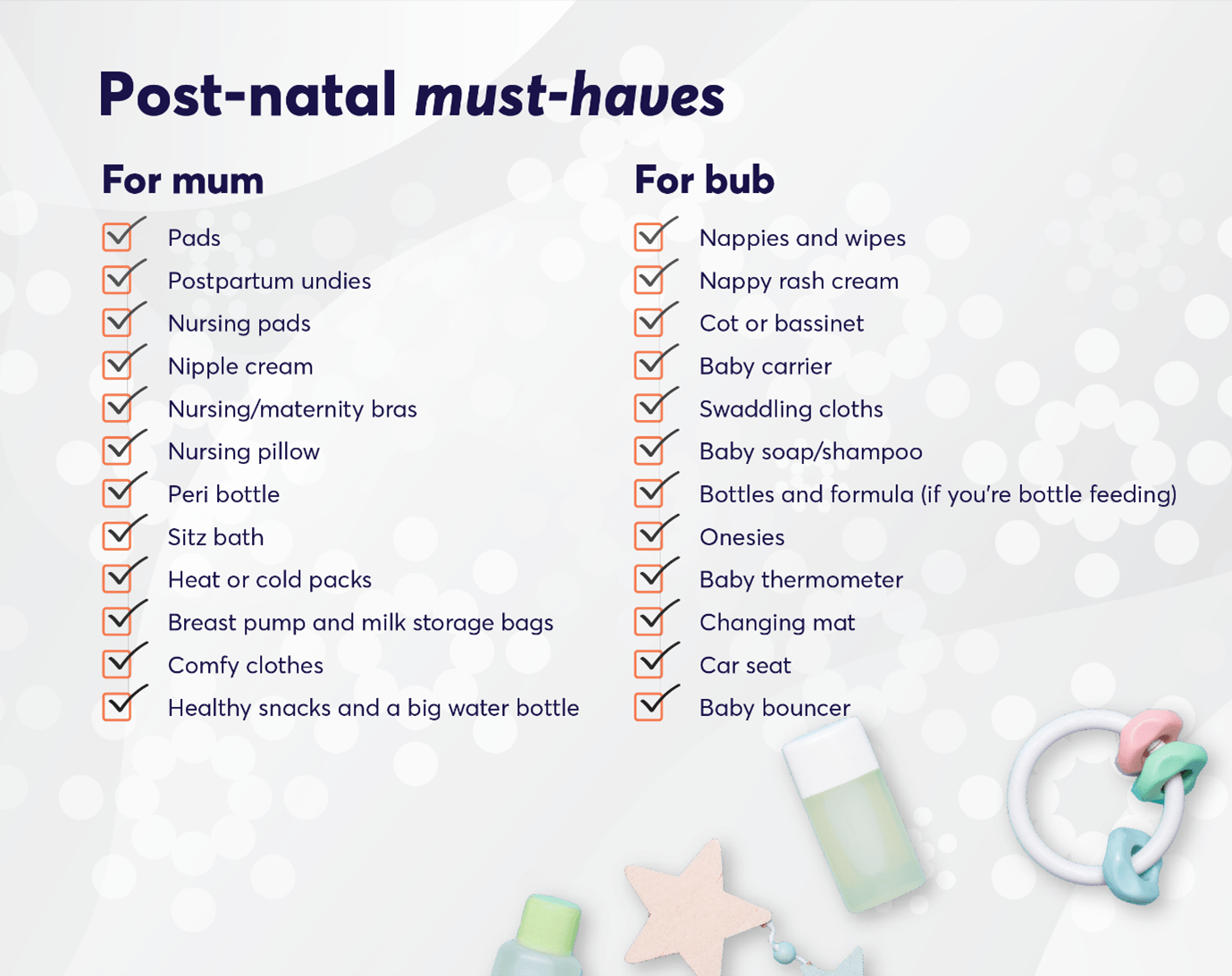- Home
- Mind & body
- The fourth trimester – a guide to the first three months with your newborn
At CBHS we help you manage your health challenges. We believe in offering you the services, support and tools you need to live your best life.
Our Better Living Programs are available to support eligible members towards a healthier lifestyle. Each Better Living Program is subject to its own eligibility criteria.
Contact us for more information and to confirm your eligibility for a program.
The fourth trimester – a guide to the first three months with your newborn

Whether you’ve heard of the term or not, all new parents go through ‘the fourth trimester’. And according to 2023 predictions by Pinterest, curiosity about this time of transition from pregnancy to parenthood is skyrocketing.
The arrival of a new baby is typically cause for celebration, but it can also be accompanied by challenges. You’re adjusting to changes in your routine and your body, dealing with sleepless nights, and taking responsibility for the wellbeing of a tiny human.
Understanding a bit more about this life-changing time can help you prepare for and deal with some common issues new parents face – and make the most of the opportunity to build a new life as a family.
What is the fourth trimester?
The fourth trimester is the first three months after you’ve had your baby. The term was coined by American paediatrician Dr Harvey Karp, who says all babies are born a bit too soon.
"Fourth trimester theory recommends creating a womb-like environment for your newborn during their first 12 weeks.”
To help bub adapt to life in the world, Kemp’s fourth trimester theory recommends creating an environment similar to that of pregnancy for the first three months after they’re born.
You can recreate a more womb-like environment for your baby in several ways.
Swaddling and rocking
While you’re pregnant, your baby is safe and secure in a limited but constantly moving space. Swaddling your baby can mimic this feeling and may help them sleep better. Gently rocking and swaying your baby is a good way to calm them down.
Some new parents find it helpful to wear their baby in a properly fitted sling. And taking them for a drive is a perennial favourite for settling restless or irritable newborns.
Skin to skin contact
Your baby knows your smell and the rhythm of your heartbeat. Spending time cuddled up skin to skin with a parent is very comforting.
Feeding
If your baby is hungry, feed them. Ideally, combine feeding and skin to skin contact for extra comfort.
Bathing
Floating in warm water feels like being in the womb and is soothing and comforting for many newborns.
Why can the fourth trimester be so difficult?
Applying the term ‘trimester’ to a period outside the nine (or so) months of pregnancy might seem odd.
"Life doesn’t just go back to the way it was after you’ve had a baby.”
But it recognises that your baby doesn’t just pop out and everything returns to ‘normal’. Anyone who’s said ‘My life won’t be any different after having my baby’ knows this just does not happen! After all, newborns are utterly dependent on their caregivers for survival.
The first three months are a time of rapid social, physical and emotional growth and development for your baby. For example, they are learning to:
- recognise and remember faces
- use their five senses to start understanding the world
- hold up their heads and move their arms and legs
- make early sounds, like cooing noises
- smile and laugh.
The fourth trimester is also a time of significant emotional and physical change for parents. As Dr Karp writes, “Newborn babies … will push their new vocal cords to the limits with screams, naps might feel few and far between and only happen on you, and you’ll find yourself on an erratic sleep schedule.”
One American obstetrician-gynaecologist explains the fourth trimester can be a time of significant vulnerability as well as one of joy. She notes mothers might be dealing with physical concerns such as the pain of tearing from a vaginal birth or a surgical incision from caesarean delivery. Breastfeeding may present physical and emotional challenges. Along with sleeplessness, new mums (and dads) may have mental health concerns.
In fact, up to one in five expecting or new mums (and one in 10 expecting or new dads) will experience perinatal depression or anxiety, according to Australian mental health charity SANE.
Helpful tips for new parents
To do the best job of looking after your baby, it’s important to look after your own health and wellbeing. New parents have a range of physical and emotional needs.
New mums can take care of themselves by:
Seeking help
Fourth trimester parenting is easier in some cultures, as members of the extended family assist new mothers while they focus on recovering and bonding with bub. But in Australia, most new mums don’t get this level of support.
You can encourage your partner (if you have one) to get involved in parenting and help you as much as possible. You might also like to ask for or accept offers of help from family or friends. During the fourth trimester, they can assist with things like:
- cooking meals
- household chores
- picking up items from the supermarket or pharmacy
- watching your baby while you rest
- caring for your other children, if you have any.
Sleeping when you get the chance
You need your sleep, so try to take every opportunity you can to rest. This might be when your baby is sleeping, or when your partner or another trusted person is free to look after them.
Eating healthily
Parenting is an energetic pursuit, especially if you’re breastfeeding. Aim to eat a variety of healthy and nutritious foods.
Learn more about healthy eating while you’re pregnant or breastfeeding.
Getting some gentle exercise
Light exercise can help you recover from birth and feel better. Remember, your body is healing, so it’s important not to push yourself too hard or do anything your doctor or other health professionals have advised against.
Learn more about getting back into exercise safely after birth.

Seeing health professionals
Your doctor, midwife or obstetrician can help ensure you recover well from birth and assist you to manage any health or wellbeing issues you might experience.
Keeping all your appointments (or rescheduling them if needed) gives you the chance to ask questions and helps you stay on top of your physical and mental wellbeing.
You should talk to your health professional if you experience:
- a fever or high temperature
- heavy bleeding or clots
- foul-smelling vaginal discharge
- a painful or hard breast lump
- heat, redness or oozing around any stitches
- a painful, tender or warm area in your legs.
Focusing on mental wellbeing.
Many women go through ‘baby blues’ a few days after having their baby. But if those feelings don’t go away, or they interfere with your ability to do everyday things, it could be a sign of postnatal depression. This is very common and it’s important to seek help.
"It’s important to seek help if you have any concerns about your mental health during or after pregnancy.”
If you have concerns about your mental health, you can speak to your doctor, midwife or maternal child health nurse. There are also several support services you can call, including:
- Pregnancy, Birth and Baby – phone 1800 882 436, 7 days a week, from 7am to midnight (AEST).
- PANDA (Perinatal Anxiety & Depression Australia) – 1300 726 306
- ForWhen – phone 1300 24 23 22 Monday to Friday, 9.00am to 4.30pm
- Gidget Foundation – online and telehealth support on 1300 851 758
- Beyond Blue – 1300 22 4636.
Non-birthing parents can also experience challenges during the fourth trimester. It’s important to build a relationship with your new baby, while continuing to nurture your partnership.
Some ways non-birthing parents can do this include:
- getting involved in the everyday tasks of caring for your baby – such as bathing, dressing, nappy changing and helping your partner with feeding
- having skin to skin contact time to build connection and support bub’s development
- spending one to one time with your baby and talking to them as often as possible
- asking for (and accepting) help from friends and family
- focusing on your relationship by being supportive, positive, and negotiating expectations about parenthood
- looking after your own health and wellbeing by making healthy lifestyle choices.
See Beyond Blue for more ‘Dadvice’, and MensLine Australia for tips on surviving the first month with a new baby.
Post-natal must-haves
Being well-prepared is another way to ease the shift from pregnancy to parenthood. Here’s a handy list of fourth trimester must-haves.

How new parents are using social media for support
What could be more natural after giving birth than spamming your friends and family with adorable pics of your beautiful bundle?
"Along with supplying a steady stream of cuteness overload, new parents are using social media for advice and inspiration”
Aside from overloading the apps with cuteness, new parents are turning to social media for advice and inspiration.
Pinterest reports people are increasingly turning to them for their postpartum needs. Searches for postpartum must-haves are up 40%, postpartum meals by 70%, and postpartum essentials by 85%.
A word of caution: not everyone who purports to be a parenting expert actually is one. Be careful of what advice you heed. While you can certainly take inspiration from what you see on social media, it’s safest to stick with evidence-based information from reputable sources, like governments, universities and qualified specialists.
Given people tend to post about their highlights, social media can also paint an unrealistic picture of the realities of new parenting. In fact, one survey found social media may be partly responsible for triggering anxiety and depression symptoms in parents, with 22% reporting that happy family pictures made them feel inadequate.
But when used wisely, social media can be a great place to connect with other parents, share stories, ask questions, and find support for fourth trimester parenting.
All information contained in this article is intended for general information purposes only. The information provided should not be relied upon as medical advice and does not supersede or replace a consultation with a suitably qualified healthcare professional.
Sources
https://www.cbhs.com.au/mind-and-body/blog/how-to-best-manage-the-family-schedule
https://www.happiestbaby.com/blogs/baby/fourth-trimester
https://www.pregnancybirthbaby.org.au/news/what-is-the-fourth-trimester
https://www.cbhs.com.au/mind-and-body/blog/benefits-of-massaging-your-baby
https://www.betterhealth.vic.gov.au/health/healthyliving/child-development-1-newborn-to-three-months
https://www.health.harvard.edu/blog/the-fourth-trimester-what-you-should-know-2019071617314
https://www.sane.org/information-and-resources/facts-and-guides/perinatal-mental-illness
https://www.cbhs.com.au/mind-and-body/blog/safe-sleeping-for-your-baby
https://www.pregnancybirthbaby.org.au/safe-return-to-exercise-after-pregnancy
https://www.healthdirect.gov.au/postnatal-depression
https://www.pregnancybirthbaby.org.au/about-pregnancy-birth-and-baby#access
https://forwhenhelpline.org.au/
https://gidgetfoundation.org.au/
https://www.beyondblue.org.au/
Health and wellbeing
programs & support
You Belong to More with CBHS Hospital cover:
- Greater choice over your health options including who treats you
- Get care at home with Hospital Substitute Treatment program
- Free health and wellbeing programs to support your health challenges
Live your healthiest, happiest life with CBHS Extras cover:
- Benefits for proactive health checks e.g. bone density tests, eye screenings
- Keep up your care with telehealth and digital options
- Save on dental and optical with CBHS Choice Network providers
